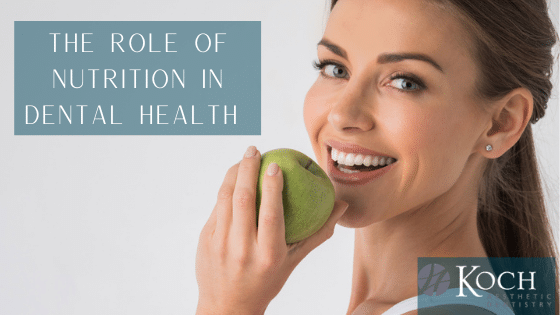
22 Jun The Role of Nutrition in Dental Health
Eating a well-balanced diet is important for our overall well-being, but did you know that it also dramatically impacts the health of our teeth? The food we eat provides essential nutrients and minerals that build our teeth and the gum tissues surrounding them. A healthy diet is also necessary for tissue regeneration and can prevent issues like infection, periodontal disease. Here is a closer look at how what you choose to eat affects your oral health.
Foods that Can Cause Harm to Your Teeth
Foods that are high in sugar and starches can increase the production of acid in your mouth. This acid can erode the outer layer of your tooth (enamel) and eventually cause tooth decay. Acid-loving bacteria that live in our mouths also love to feed on this acid and multiply their numbers – causing further deterioration. Fast food, processed foods, desserts, candy, and starchy foods like potatoes fall under this category and should be consumed in moderation.
Foods that Can Help Your Oral Health
Wanting to have healthy teeth doesn’t mean that you never get to eat anything fun. Instead, try to limit the amount of harmful foods you eat and add lots of foods that help take care of your teeth. Check out some examples below.
Fruits and Vegetables
Fruits and vegetables are a great choice for a healthy smile because they contain a lot of fiber and water, which balance out their sugars and simultaneously clean the teeth. Fruits and vegetables are also efficient at stimulating saliva production. Saliva helps wash away harmful acids, bacteria, and food remnants from the teeth, preventing decay.
Fruits also contain vitamins C and A. Vitamin C is important for healthy gums and wound healing. And vitamin A helps build tooth enamel.
Calcium and Protein-Rich Foods
Leafy greens, tofu, milk, cheese, and yogurt all contain calcium and other tooth-friendly nutrients. And meat, poultry, fish, milk, and eggs are high in protein and phosphorus, both of which help to protect and rebuild tooth enamel.
Vitamin D
Vitamin D influences the regulation of calcium and phosphate metabolism. Studies suggest that low vitamin D levels in children correspond with increased tooth decay (caries). And another study showed that higher prenatal intake levels of vitamin D in women helped lower the likelihood of tooth decay in their babies.
We get vitamin D from sun exposure and from our diet. Foods that are high in vitamin D include eggs, salmon, sardines, tuna, and mushrooms. In addition to eating the foods mentioned above, you can also take a vitamin D supplement to make sure you are getting a sufficient amount.
Regular Cleanings and Dental Care
Because the foods we eat inevitably create acid production in our mouths, it is important to brush and floss regularly. And, of course, coming in for regular dental cleanings is necessary for removing plaque and decay-causing bacteria as well as preventing diseases like periodontal disease.
Keeping tabs on your dental needs is imperative, but it’s normal to have some questions. That’s why talking to a professional is recommended. Our dental team can suggest proper dental care and provide oral health-related nutritional advice.
Koch Aesthetic Dentistry in Birmingham, Alabama Takes Care of Your Oral Health!
At Koch Aesthetic Dentistry, we pride ourselves on creating customized care plans for patients. We want to make sure you are healthy and looking great – healthy teeth mean a happy you! If you’d like to learn more about our routine exams, cleanings, fillings, crowns, and more – contact us today.


